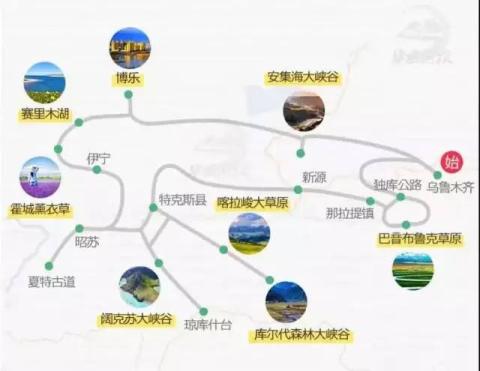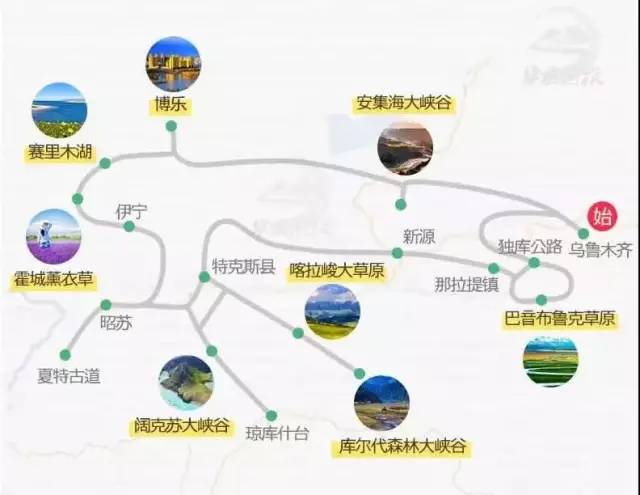
Xinjiang, known as the Western Regions in ancient times, had human activities in the pre-Qin period. In order to defeat the Huns and consolidate their rule, Emperor Wu of the Han Dynasty Liu Che decided to "connect to the Western Regions, cut off the right arm of the Huns, and isolate the Southern Qiang and Yuezhi." For this reason, he first sent Zhang Qian on two missions to the Western Regions to strengthen ties with other places in the Western Regions and jointly deal with the Xiongnu. He sent powerful troops to conquer and made a large number of countries in the Western Regions surrender. In 101 BC, in Luntai and Quli Troops were stationed in the fields and other places, and envoys and captains were placed to lead them. In 60 BC, the central government of the Western Han Dynasty established the Western Region Protectorate, and Xinjiang officially became part of China's territory. In AD 73, Emperor Ming of the Han Dynasty sent generals out to the north of the Great Wall to attack the Huns, and also sent Ban Chao to Shanshan and Khotan to kill the Huns envoys. Shanshan and Khotan sent their sons to serve as servants and belonged to the Han Dynasty. In 74 AD, Shule returned to the Han Dynasty. In the winter of that year, the Eastern Han Dynasty established the Protector of the Western Regions and Wuji Xiaowei, restoring Han rule over the Western Regions. In the long course of history, with the rise and fall of the Central Plains Dynasty, the Western Regions and the Central Plains Dynasty merged at times.
In 1697, the Qing army defeated Junggar and took control of eastern Xinjiang. During the reign of Emperor Yongzheng, the Western Regions and Yunnan, Sichuan, Guizhou and other areas newly included under the rule of the Qing Dynasty were collectively known as the "Six Halls of Xinjiang". In 1755, the Qing Dynasty captured Gulezha. In 1757, the Qing Dynasty completely put down the Junggar rebellion. Emperor Qianlong named this land "Xinjiang", which means "new return to the homeland". From then on, "Xinjiang" became the name of this land. The proper name of the land. In 1759, the Qing Dynasty also quelled the rebellion of the Hui tribe south of the Tianshan Mountains due to the disappearance of the Junggar tribe, that is, the leader of the Islamic Baishan sect, Xiao Hezhuo. From then on, the Qing Dynasty's stable rule over Xinjiang was completely established, and the Kazakh Khanate was relieved from the Junggar tribe. Threat from the nobility. The three Yuzi, large, medium and small, have successively expressed their submission to the Qing Dynasty, Kazakhs and Buluts, various tribes west of Congling and Kokand, Badak Mountain, Pamir and Buha in western Xinjiang today. Er, Shank, Tashkent, Aiwuhan (Afghanistan), etc. have expressed their allegiance. In 1771, the Torgut people, led by their leader Obasi, defeated the obstruction of Tsarist Russia and returned to their motherland from the Kazakh grassland thousands of miles away. After the Opium War, this country suffered a fateful fate and was robbed of a large area by Tsarist Russia. On September 25, 1949, the First Corps of the First Field Army, led by General Wang Zhen, captured Urumqi. October 1, 1955 was the establishment of the Xinjiang Uygur Autonomous Region, and Xinjiang entered a new chapter in history.
Xinjiang covers an area of 1.6 million square kilometers, accounting for 1/6 of the land area. Mountains and basins are alternately arranged, basins and mountains are surrounded, and it is known as "three mountains and two basins". The Altai Mountains in the north, the Kunlun Mountains in the south, and the Tianshan Mountains lie across central Xinjiang, dividing Xinjiang into northern and southern halves, with the Tarim Basin in the south and the Junggar Basin in the north. It is customary to call the south of the Tianshan Mountains the southern Xinjiang, the north of the Tianshan Mountains the northern Xinjiang, and the Hami and Turpan basins the eastern Xinjiang.
In June 2017, I visited Xinjiang twice to participate in the Kalajun-Kurdenin and Bogda loop hikes. Because I was hiking, I didn’t visit many places, but it gave me a very special feeling. I was shocked, and I just sighed, "It's too late, it's worth coming more."
Time passed quickly, and two years passed in a hurry. In May, some friends from Xinjiang were urging me to go to Xinjiang again. I also sent a route link from Ili to Duku. I felt that the contractor was not from Urumqi, so it was a bit inconvenient, so I searched online for a travel company in Urumqi - Ili Grassland organized by Xinjiang Huayu Travel Agency +Duku panoramic 9-day tour, focusing on sightseeing tours and car tours. The travel agency is responsible for airport pick-up and drop-off, which is very convenient. I signed up for a small group of 4-5 people from June 22nd to 30th, in an 8-seater commercial vehicle, which was relaxing and comfortable. Later, because my wife was busy and unable to make the trip, our team turned out to be three tourists plus a driver and tour guide.

On the 22nd, I took a flight to Urumqi at about 11 o'clock so that I could take the airport bus to the airport calmly. The sky was a little cloudy and it seemed like it was going to rain. I checked the weather forecast and it was also raining in Xinjiang in large areas. I was thinking, don't do it. It’s also rainy in Xinjiang, which is a disappointment. Then I thought about it, this tour covers a large area, so we should be able to have good weather.
The clouds were very heavy, and it was as white as a snowfield. There was nothing interesting to see, so I leaned back on the chair and closed my eyes to rest. About an hour had passed since I opened my eyes. The dense snowfield turned into piles of marshmallows, stretching from under the fuselage until it disappeared into the sky. I vaguely feel that there are stretching mountains under the clouds. Judging from the time and distance, it should be west of Lanzhou. Could it be the Qilian Mountains?
Continuing to fly westward, the clouds have become much thinner, and snow peaks are exposed from the gaps in the clouds. If there are snow peaks in several areas during this season, it can be concluded that it is the Qilian Mountains. Gradually, the mountain reached the left side of the plane, and there was a vast expanse of yellow sand under the fuselage. Finally, the mountain and the white clouds also moved away from us.
From the plane, you can distinguish some large alluvial landforms, you can also see some mountains, towns, and one or two green lakes. You can even see a reflector, which is shining white. About half an hour later, the clouds slowly covered the entire field of vision again. It was not until a long time after the broadcast announced that the plane had started to land that we saw the earth again. The mountains that seemed to be not undulating much were brown and yellow with a hint of green. The slender valley between the two mountains is still so lush and green, followed by large buildings as far as the eye can see - I have arrived in Urumqi.
My classmate Zhang in Xinjiang received me. Barbecuing meat on the stove and adding wine to the party were naturally indispensable. I felt very refreshed. I bought some fruits and dried fruits for the next day, and then went back to my room to rest. My classmate thought that our departure was too early the next morning, which prevented him from sleeping in, and he did not accompany me to have fun, so he went back to his place early, but this time it was already past eleven o'clock.







I got up a little after 6 o'clock, thinking about where to take pictures of the sunrise. There were tall buildings on all sides, and the roof was locked. My room is at the end of the corridor. I was standing at the door of the room and was worried when I suddenly discovered that the rusty iron door at the end of the corridor was only plugged in from the inside and not locked. It was a fire escape and could not be closed according to regulations. Lock. The iron door was a bit heavy, and when I pulled the latch, it made a clang or two, but there was no rattling sound at all. Outside the door is a steel staircase that was added later. It seems that no one has ever walked past it. It should have been added later during the fire inspection and acceptance, and it is not used normally.
It was 7 o'clock, and I stood on the platform of the outdoor stairs. The sun was already slightly higher than the top of the tall building in the distance. The sky was full of dark clouds, leaving just such an empty space to watch the sunrise. 
